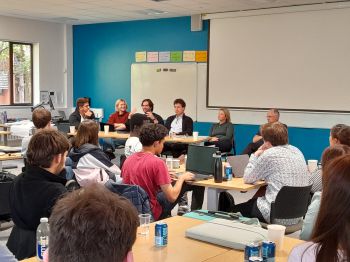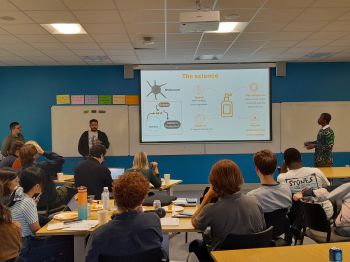SPRU news items
Read news from the Science Policy Research Unit at the University of Sussex.
Business School trains biotech PhD students with business and entrepreneurship skills
By: Lauren Sarruf
Last updated: Tuesday, 14 October 2025

Participants presenting their innovation ideas on the final day of the summer school

Participants presenting their innovation ideas on the final day of the summer school
In September, the University of Sussex Business School hosted a summer school for PhD students from the South Coast Biosciences (SoCoBio) Doctoral Training Partnership, helping future scientists bridge the gap between bioscience research and real-world innovation.
Delivered by colleagues from the Business School’s Science Policy Research Unit (SPRU), the intensive week-long programme equipped students with the skills needed to translate bioscience research into applications in healthcare, food production, and sustainability.
Building skills for real-world impact
While bioscience students receive extensive training in laboratory and technical skills, employers often highlight the need for a broader understanding of business and policy.
Drawing on SPRU’s expertise and networks across the UK’s biotech innovation ecosystem, the course provided a well-rounded introduction to the public-facing side of science.
Students attended lectures and interactive sessions on intellectual property, finance, marketing, regulation, strategy, and deal-making. The teaching team included Professors Michael Hopkins and Adrian Ely, and Drs Philippa Crane (University of Sussex) and Michael O’Neill (biotech consultant), combining academic and industry perspectives.
From concepts to commercial ideas
Throughout the week, teams of students worked together to apply their learning to the development of a hypothetical biotech enterprise. Their task culminated in a pitch for an imaginary £3 million investment, presented to a panel of judges with deep industry experience.
The judging panel included the Sussex teaching team and representatives from Nucleate – the world’s largest global community of bio-innovators – and Pillar VC’s Encode programme, which connects AI talent with leading science labs to accelerate innovation.
Students received tailored feedback on their business ideas and presentation style, helping them refine their communication and entrepreneurial thinking.
Continuing the learning journey
The summer school forms part of a larger seven-week online distance learning (ODL) module, allowing students to build on what they learned in Brighton. This extended course will culminate in a final £10 million pitch in October, further developing students’ ability to design viable, research-based ventures.
Reflecting on the experience, Juri Westendorf, a SoCoBio PhD student, said: “On the other end of pitching a multi-million dollar ask, with the adrenaline wearing off and the summer school ending, it’s time to let the impressions sink in. I’ve interacted more with nearly everyone in the cohort this week than in the entire year before. First impressions were debunked, and new ideas and overlapping research areas were uncovered. Many of us expected a week of going back to school but instead discovered that the material was engaging and that we genuinely cared about coming up with something good as a team.”
Student feedback and key takeaways
Evaluation responses reflected a strong sense of engagement and enthusiasm. Students highlighted the pitching and financing sessions, intellectual property (IP), and presentation skills as the most valuable parts of the course.
“The insights from industry experts were handy,” one participant noted.
“Developing presentation skills, learning about IP, and hearing from people with real-world experience made all the difference,” said another.
When asked which aspects they would utilise most in the future, the majority cited IP knowledge, pitch development, and presentation and teamwork skills —skills directly transferable to careers in academia, start-ups, and industry.